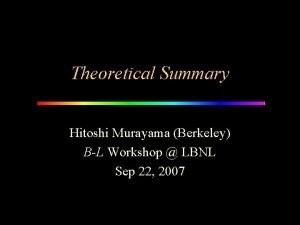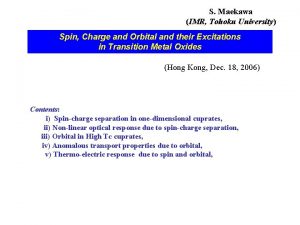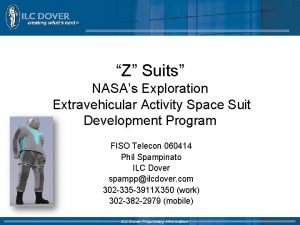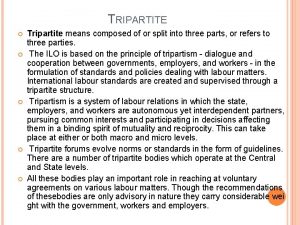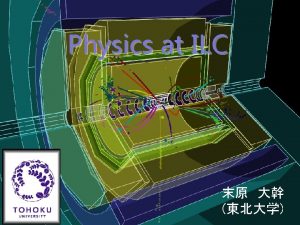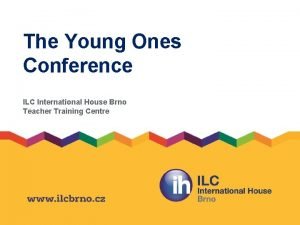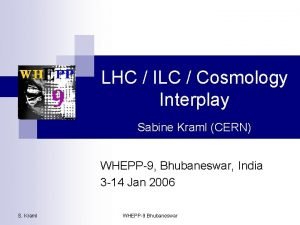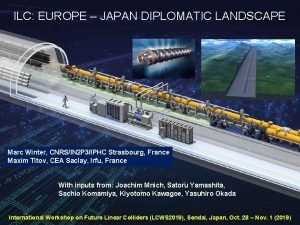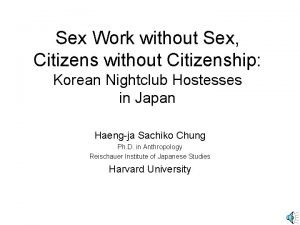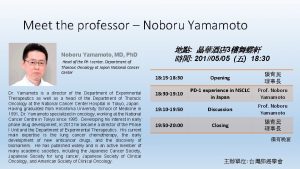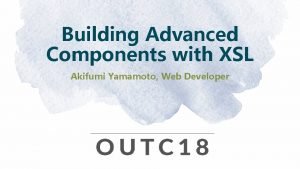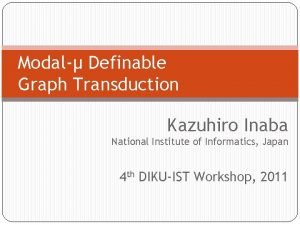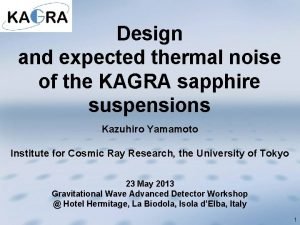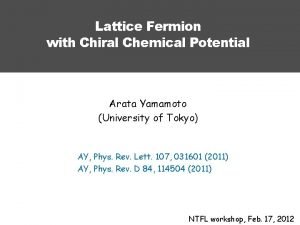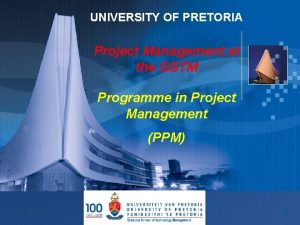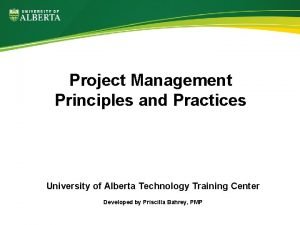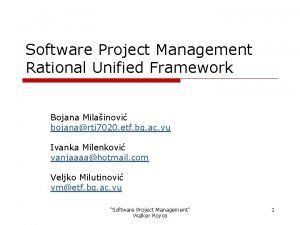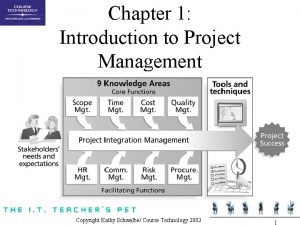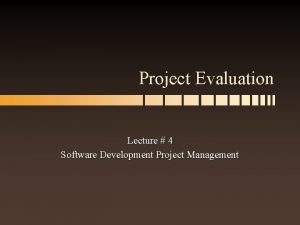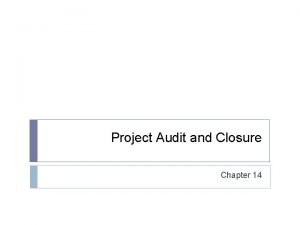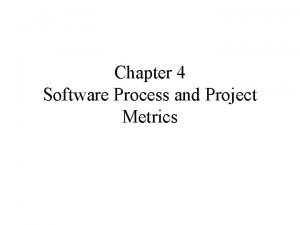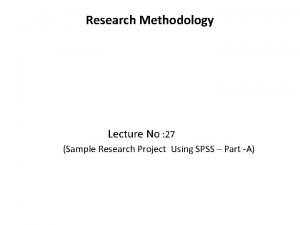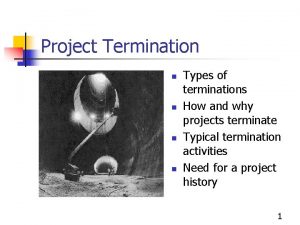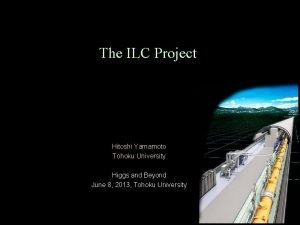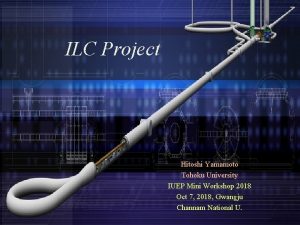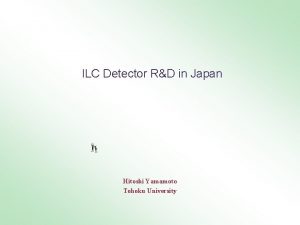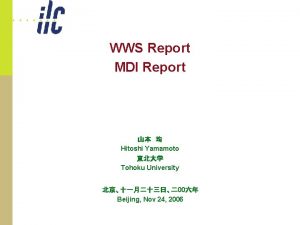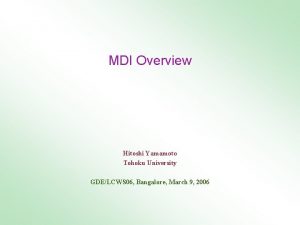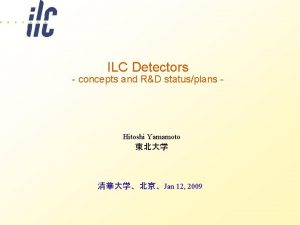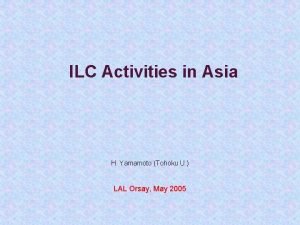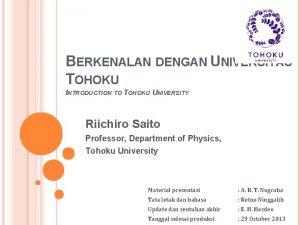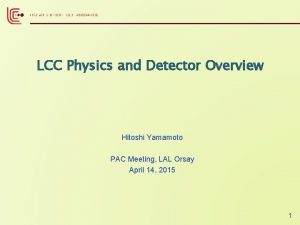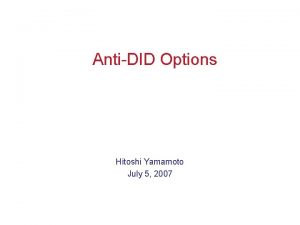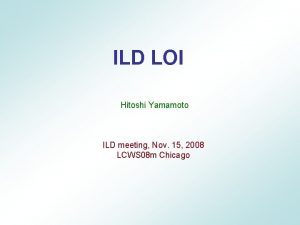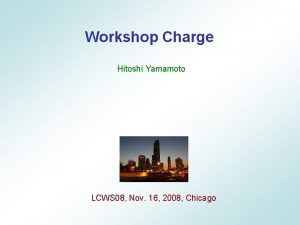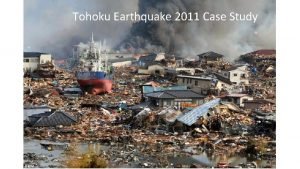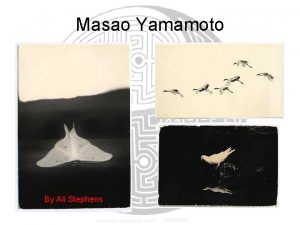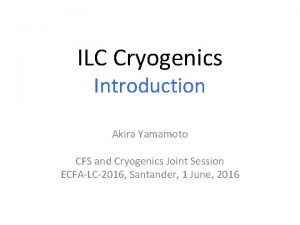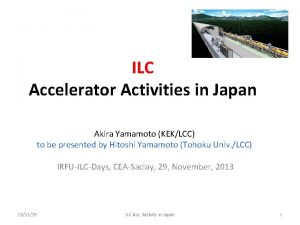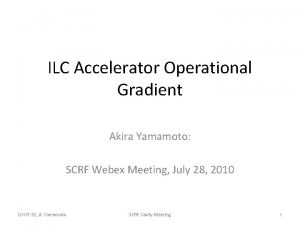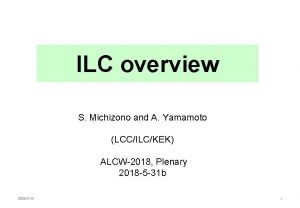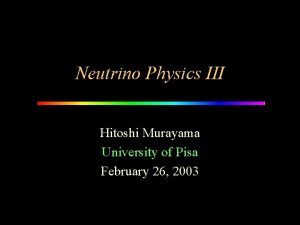ILC Project Hitoshi Yamamoto Tohoku University INSTR 2014





































- Slides: 37

ILC Project Hitoshi Yamamoto Tohoku University INSTR 2014 Novosibirsk, February 23, 2014

ILC (International Linear Collider) Main g g rin pin Dam c lina on sitr m bea Po li Main nac electr on m 31 k e+ e- collider l 500 Ge. V CM with 31 km → upgrade later to ~ 1 Te. V CM with 50 km l IP beam size : 6 nm high, 500 nm wide 300 mm long (@500 Ge. V CM) l Luminosity 1. 8 x 1034 /cm 2 s (@500 Ge. V CM) l First stage : 250 Ge. V Higgs Factory

F ILC TDR Completion June 12, 2013 ‘A World-wide Event – from design to reality’ Fermilab Tokyo CERN

New International LC Organization LC Board LCC (LC Collaboration) Chair : Sachio Komamiya Deputy Director LC Collaboration Director Hitoshi Murayama Lyn Evans ILC accelerator CLIC accelerator ILC/CLIC Phys. /Det. Mike Harrison Steinar Stapnes Hitoshi Yamamoto In full operation since June, 2013 4

ILC Timeline by LCC • 2013 - 2016 – Negotiations among governments – Accelerator detailed design, R&Ds for cost-effective production, site study, CFS designs etc. – Prepare for the international lab. • 2016 – 2018 – – ‘Green-sign’ for the ILC construction to be given (in early 2016 ) International agreement reached to go ahead with the ILC Formation of the ILC lab. Preparation for biddings etc. • 2018 – Construction start (9 yrs) • 2027 – Construction (500 Ge. V) complete, (and commissioning start) (250 Ge. V is slightly shorter)

ILC Physics

ILC features : cleanliness ■ Collision of two elementary particles l proton + proton at LHC l l quark Proton = 3 quarks + gluons electron + positron at ILC gluon → Signal is clearly seen without much noises → Trigger-less data taking → Theoretically clean (less theoretical uncertainties) LHC proton ILC electron ILC All from Higgs positron

ILC features : control ■ Initial state of electron-positron interaction : l l Energy-momentum 4 -vector is specified Electron polarization (80%~90%) is specified l Positron polarization (60%) is optional (30% comes for free) Energy-momentum 4 -vector → e. g. recoil mass analysis: tagged Higgs to ALL (including invisible final state) ILC H�gg LHC H�ZZ

Electron polarization Specify the intermediate state l e. g. Right-handed e- turns off A 0 l e+ Information on the gauge structure of the final state g, Z (B, A 0) Increase rates l e. g. P- /P+ = -0. 8/+0. 3 : Increases the H production mode s(nn. H) by X 2. 34 (=1. 8 x 1. 3 ) ee+ W+ e- W- Background rejection l Right-handed e- turns off W e. g. acoplanar muon pair produciton such as smuon pair production

ILC @1 Te. V Higgsstrahlung W fusion Higgs production Luminosity each energy for ~3 years • At higher Ecm – W fusion dominant – More Higgs – New particles ! • Good for Higgs self coupling e+e- � nn. HH – Effect of irreducible diagrams less important dl/l = 0. 76 ds/s @ 1 Te. V (dl/l = 1. 66 ds/s @500 Ge. V) → dl/l = 13% (2. 5 ab-1 @ 1 Te. V)

Higgs Reconstruction At 250 Ge. V Recoil mass analysis d. MH = 32 Me. V (TDR) At 500 Ge. V 2 jet + nothing Main background = nn. Z

ILC Luminosity Upgrade Options • 250 Ge. V CM (Higgs factory) – X 4 luminosity @ 3 E 34/cm 2 s – x 2 Nbunch, x 2 rep rate; 120 � 200 MW wall plug • 500 Ge. V CM – x 2 luminosity @3. 6 E 34/cm 2 s – x 2 Nbunch; 160 � 200 MW wall plug • 1 Te. V CM – x 1. 4 luminosity @5 E 34/cm 2 s – Aggressive beam params; Same wall plug power

Measurement errors of Higgs Couplings (Snowmass study – Higgs WG) • All assume generation universality, no BSM → Fit – LHC ranges : optimistic (sys. err: theory = 1/2, exp. N-1/2), pessimistic (no change) • Apart from g, ILC is 1/3 ~ 1/10 of HL-LHC (w/o ILC lum upgarde) • With ILC lum upgrade, additional ~1/2 in errors • ILC can measure model-independently w/o assumptions above.

Top Yukawa Coupling Not a mode ILC is partifcularly good at Direct measurements

Higgs Width and CP • Gtot to 5% – Br(H �WW) & g(HWW) by e+e- �nn. H – Br(H �ZZ) & g(HZZ) by e+e- �HZ • CP – 3~4% (on mixing coeff) by HZ • cross sestion and production/decay angles – Or by H → tt (t polarization) • a to 6゜ w/ ab-1 at 350 Ge. V

Top mt(msbar) to 100 Me. V Sensitivity to tt. H coupling at threshold Anomalous tt. Z, tb. W, ttg coup

New Particle Search ILC Good sensitivity up to kinematic limit for (essentially) any mass difference LHC Difficulty when mass difference is small

Fermion Compositeness ILC 500 Ge. V : e+ e- → ff + - : initial helicity

Z’ couplings to identify a model e+ e- → l+l. MZ’ = 2 Te. V 1000 fb-1 at 500 Ge. V P- = 0. 8, P+ = 0. 6 MZ’ = 4 Te. V

Dark Matter ■ ■ ■ Lightest super particle (LSP) is the dark matter? Key: can theory with measured parameters explain the ‘measured’ relic density? Creation and annihilation → relic density • Need to know processes contributing to LSP annihilation Relic density estimation by LHC (red) and ILC(blue) (SUSY B’ model) 20

ILC Accelerator

ILC: How it works Produce:electron source Align:damping ring Focus:final focus System Detect:high-res detectors Accelerate:main linac Produce:Positron source

Align and Focus • Low emittance : KEK ATF (Accelerator Test Facility) – Achieved the ILC goal. • Small vertical beam size : KEK ATF 2 – Goal = 37 nm, 65 nm achieved • Limit is in measurement. No basic problem seen. • Stabilize the beam at nm scale: KEK ATF 2 – Feedback system successful (FONT) 23

Accelerate : Main LINAC • Principle of acceleration – Generate strong RF wave in a cavity – Synchronize such that particle is always accelerated forward • ILC accelerating cavity – – Superconducting (niobium) 1. 3 GHz (L band) 9 cell, 1 m Accelerting gradient • Average 31. 5 MV/m • 250 Ge. V/31. 5 Me. V = 8000 cavities needed → 8 km (In reality 11 km/side) 超電導加速空洞 (Ichiro cavity) 1 m

Main LINAC Achievements • Accelerating cavity – Spec: 31. 5 MV/m ±(<20%) – >80% yield achieved (RDR goal achieved) • Cryomodule assembly – Combine cavities from all over the world • KEK S 1 -global successful ILC technology is now ‘ready’ 25

Status of the ILC Mostly in Japan

International Supports • Europe : ‘European Strategy’ (March 22, 2013) – There is a strong scientific case for an electron-positron collider, complementary to the LHC, that can study the properties of the Higgs boson and other particles with unprecedented precision and whose energy can be upgraded … The initiative from the Japanese particle physics community to host the ILC in Japan is most welcome, and European groups are eager to participate. Europe looks forward to a proposal from Japan to discuss a possible participation. • US : HEPAP facilities subpanel report (March 22, 2013) – The initiative from the Japanese particle physics community to host the ILC in Japan is very welcome, and the U. S. particle physics community looks forward to a proposal from Japan to discuss possible participation. – For the final US strategy, wait for the HEPAP subpanel (P 5) report (March-May, 2014) 27

LDP Political support : (Liberal Democratic Party : New Ruling Party) election platform ‘ILC’ appears twice explicitly 32 Rebuilding true command tower functions that strongly advance science and technology policies – …We will actively promote the critical fields of energy creation, energy conservation, energy storage, etc. as knowledge-concentrated national strategies - for example, our country should be able to play a leading role in creation of international centers for scientific innovations such as the ILC (the international linear collider) project which is a grand project in the field of particle physics. 92 Creation of globally top-class centers for research and development – …We will significantly strengthen supports for universities and public research facilities that perform studies at levels above the intentional standards, such as significant expansion of WPIs and playing a leading role in creation of international centers for scientific innovations such as the ILC (the international linear collider construction) project which is a grand project in the field of particle physics. 28

Press conference by the MEXT minister Shimomura Jan 18, 2013 ‘(On ILC) We would like to consider the plan for the near future, while as the government actively negotiating with relevant countries in the first half of this year … we are now studying the legal framework. ’ The Japanese government did start to talk to other governments. 29

Science Council of Japan Report submitted : Sep 30, 2013 (Official translation) • • • …the Committee appreciates the need for and scientific significance of an electron-positron collider as a unique complement to the proton-proton collider. The Committee suggests that the government of Japan should (1) secure the budget required for the investigation of various issues to determine the possibility of hosting the ILC, and (2) conduct intensive studies and discussions among stakeholders, including authorities from outside highenergy physics as well as the government bodies involved for the next two to three years. In parallel, it is necessary to have discussions with the research institutes and the responsible funding authorities of key countries and regions involved outside of Japan, and to obtain clear understanding of the expected sharing of the financial burden. MEXT has requested ~$0. 5 M for the investigatory study which was approved on Dec 24, 2013 30

A Letter to the DOE Secretary from the Federation of Diet Members for the ILC (~160 out of ~700 diet members total) Jan 8, 2014 … In Japan, for the first time ever, the government has allocated a budget for the coming Japanese fiscal year to investigate and examine the ILC itself… This has great significance in that the Japanese government has shown a vital interest in the ILC project. … The ultimate decision to host the ILC project rests with the Japanese government and the Diet. Both houses of the Diet are strongly in support of the ILC project. We have reached the stage where we must now work together with the other government for the realization of the ILC. The Japanese government intends to perform concentrated investigations and address the major issues and arrive at a conclusion about hosting the ILC by the end of JFY 2015. 31

The most important issue for the realization of the ILC is whether it can become a truly global project. For this purpose, the Japanese government is currently gathering information from abroad and is starting talks with the United States and European countries about forming a partnership. … All 3 have served as the MEXT minister 32

ILC Candidate Sites in Japan Kitakami • Kyushu – Sefuri mountains • Tohoku – Kitakami mountains ‘ILC site evaluation committee’ (JAHEP) Co-chairs: Kawagoe, Yamamoto evaluated them based on 1. Geology and other technical aspects 2. Socio-economic conditions Selected the Tohoku Site (Aug 23, 2013) Sefuri

Kitakami Site • • Flexibility in positioning the 50 km route Shorter access tunnels Natural Drainage etc… Oshu-city Ichinoseki-city Sendai 34 Kesennuma-city

Summary • With the discovery of Higgs, the physics case for the ILC is now stronger than ever • ILC accelerator design is ‘ready’ with the completion of TDR • The ILC detectors are pushing the state of the art of particle detection technologies • Japanese government is now negotiating with other governments toward realization of a truly global ILC lab • There are strong supports from the international scientific community. (will they translate to real commitments? ) 35

Sefuri Site

ILC route vertical cross section Kitakami ~100 m above sea level Sefuri Matsuura River Below sea level 0.5% tilt
 Hitoshi murayama
Hitoshi murayama Takeshi tokuyama
Takeshi tokuyama Imr tohoku
Imr tohoku Tohoku
Tohoku Coxicard
Coxicard Zsuits
Zsuits There are....tripartite committees at the national level..
There are....tripartite committees at the national level.. Ilc 2013
Ilc 2013 Ilc 150 eth
Ilc 150 eth Zora rutar ilc
Zora rutar ilc Boom chicka boom
Boom chicka boom Kaon cp violation
Kaon cp violation David,i
David,i Chihiro yamamoto sex
Chihiro yamamoto sex Dr. akira yamamoto
Dr. akira yamamoto Akifumi yamamoto
Akifumi yamamoto Kazuhiro inaba
Kazuhiro inaba Kazuhiro yamamoto
Kazuhiro yamamoto Arata yamamoto
Arata yamamoto 沈榮麟
沈榮麟 Ppm university of pretoria
Ppm university of pretoria Rasic chart
Rasic chart Faculty management system project report
Faculty management system project report Princeton university’s gerrymandering project
Princeton university’s gerrymandering project The role of project management in achieving project success
The role of project management in achieving project success Example of background of the project
Example of background of the project Walker royce software project management
Walker royce software project management Cost duration graph
Cost duration graph Modern project management began with what project
Modern project management began with what project Project evaluation in software project management
Project evaluation in software project management Traditional project management vs modern project management
Traditional project management vs modern project management Types of project audit in project management
Types of project audit in project management Integrating metrics within the software process
Integrating metrics within the software process Ms project agile planning
Ms project agile planning Example of methodology in research proposal
Example of methodology in research proposal Type n terminations
Type n terminations Teacher twins 2014
Teacher twins 2014 Who traditional medicine strategy: 2014-2023
Who traditional medicine strategy: 2014-2023
